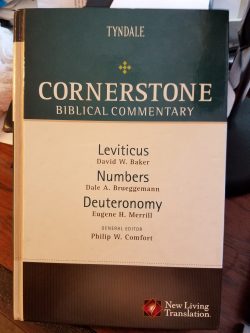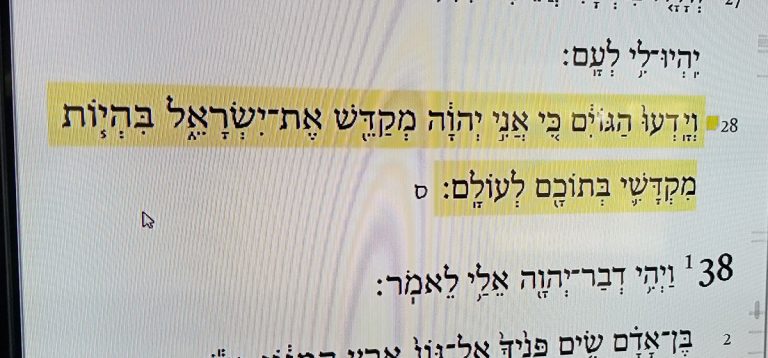Note on the End of Numbers
 I’m about to move from the section on Numbers in the Cornerstone Biblical Commentary and from there go on to reading Deuteronomy. I’m reading this in parallel with a reading of the Hebrew text.
I’m about to move from the section on Numbers in the Cornerstone Biblical Commentary and from there go on to reading Deuteronomy. I’m reading this in parallel with a reading of the Hebrew text.
I’ll first note that I find this commentary very helpful, and I believe it would be helpful to a person preparing lessons or sermons on these books (Leviticus, Numbers, and Deuteronomy), which are not that easy to work with. The authors of all three sections provide good theological reflections on the passages, which I find helpful despite the fact that they are somewhat more conservative than my own theology.
One of the keys for Christians reading the Pentateuch is being open to the questions and looking for the answers. It is much less important to have a set of “good” answers at hand when you finish. It’s OK to admit that the culture reflected is very different from modern culture, and is hard for us to apply. As I have noted before, and recently read in Luke Timothy Johnson’s NTL commentary on Hebrews, modern Christians don’t really understand the idea of sacrifice, amongst other things, and so see the entire tabernacle/sanctuary service/cult as a foreign land.
Numbers 35 illustrates some difficulties. Here we have the concept of the avenger who will kill the person who has killed (even accidentally) a relative. So the cities of refuge are provided. There the killer can find refuge provided the killing was inadvertent. (Just how “inadvertence” is defined is up for some discussion.) In this passage we find the rule requiring at least two witnesses for a capital charge.
So we have a mitigation of vengeance killing, yet even if the person is found innocent of capital murder, he will be restricted to the city of refuge. Having been found not guilty, he still suffers exile. But modern readers may miss what many commentators see as the reason he remains until the death of the high priest. The death of the high priest is seen as atoning. I find the argument for this latter point less compelling than some, but nonetheless a serious possibility, and one which might well impact our understanding of Jesus as both high priest and sacrifice in Hebrews.
Which leads backward, in a sense, to the idea that the land itself is polluted by murder and that atonement must be made in order to remove this pollution. The atonement for intentional, premeditated murder can only be made by the death of the murder, and no ransom can be accepted. There is no indication in the text of what happens in case of doubt, when two witnesses cannot be produced. There would be no atonement. Clearly, people are not expected to atone for a sin they cannot determine existed.
We have here a tension between what we would see as Christian principles and a society based on vengeance. There is mitigation, and yet there is considerable accommodation as well. I think it is a good example of how God works with people. It’s easy for us to say that God should make things absolutely right (as we see it) in an instant. But it is not that easy to change a culture and a society.
Yet if you look at Judaism today, you see an amazing edifice built on just this kind of material, and Christianity grew out of this same soil with some interesting outside influence!
